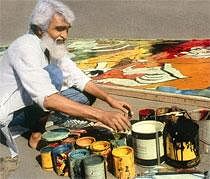
Three tributes this week to India's most visible face in contemporary art promise a comprehensive panorama of the aesthetic landscape that built itself around the legend over a span of more than 60 years.
Husain, who passed away in London June 9 this year, was part of a group of cross-cultural group of painters who gave Indian art a distinct language post 1947 and inspired at least five generations of young artists.
The most significant showcase is a retrospective, "Celebrating Husain", presented by the Delhi Art Gallery, a prestigious art house with one of the largest collections of the artist's works dating back to the late 1940s.
The exposition takes a holistic look at Husain's legacy with a medley that includes the master's art, murals, toys, photographs, drawings, films ("Meenaxi: The Tale of Three Cities", "Through the Eyes of a Painter" and a documentary on the artist Laurent Bregeant) and archival documents, said art critic and writer Kishor Singh, who is head of the exhibitions and publications department of the gallery.
The exhibition opens at the DLF Atrium in the capital Aug 7. "This is the first ever retrospective of Husain in India since he left the country in 2006. The art works we are displaying cover nearly 60 years of his career; from 1949 to his recent works. After he stopped painting film posters, Husain began to design and craft toys as an employee of a children's furniture company. We have brought out a large collection of his toys, rarely seen before," Kishor Singh told IANS.
Earlier this year, the gallery courted controversy when it exhibited Husain's art at the India Art Summit following attacks by Hindu rightwing activists.
"But we managed to carry on with the show with the support we received from viewers, organisers and the fraternity. Our efforts need to be recognised," Singh said.
Another highlight is a reproduction of a ceiling mural, "The Enchanting Damsel of Delhi", which Husain painted for the DLF Group in the 1980s, when the company employed him as an art advisor. The mural is a description of Delhi's changing urban panorama, Singh said.
Gallerist Payal Kapoor, the owner of Arushi Arts, has dedicated her third annual showcase "Harvest" to Husain with works by nearly 80 artists, including those by Husain, his peers at the Bombay Progressive Artists' Group and several young contemporary artists who were encouraged by Husain.
The exposition, "Homage to Husain", will open Aug 7 at the Stainless Gallery in the capital.
"This edition of Harvest is an attempt to show the continuity of Husain's art into the present. Our gallery has been associated with Husain for the last 20 years. I often sent portfolios of younger artists to him to which he replied with a comment. He was known for encouraging young artists," Kapoor told IANS.
She has included the works of several of these young artists, whom Husain endorsed, in her collection.
"Husain maintained that art must remain faithful to its Indian traditional roots to go global," she said.
Art critic and writer Suneet Chopra says the reason why Husain stood out in the firmament of Indian contemporary art was for his ability to assimilate cross-cultural influences and ideas.
"Although Husain was from a Muslim family (of Yemeni origin), he lived in the ancient town of Pandharpur with its temple of Vishnu whose people sustained craftsmen of different religions, including Husain's grandfather, who made metal lamps. This upbringing as a member of the craftsmen family gave him a deep understanding of Hinduism as a lived religion with its easygoing familiarity with the gods," Chopra says in an explanatory note on Harvest.
A weeklong showcase of limited edition serigraphs (prints) of Husain's work at the Visual Arts Gallery here, printed by Ahmedabad-based Archer Graphic Studio, will allow middle-end collectors to carry Husain home this week.
The prices of Husain's works - both originals and prints - which are in great demand internationally have doubled since the artist's death, touching the five-digit mark, a source in the art industry said.